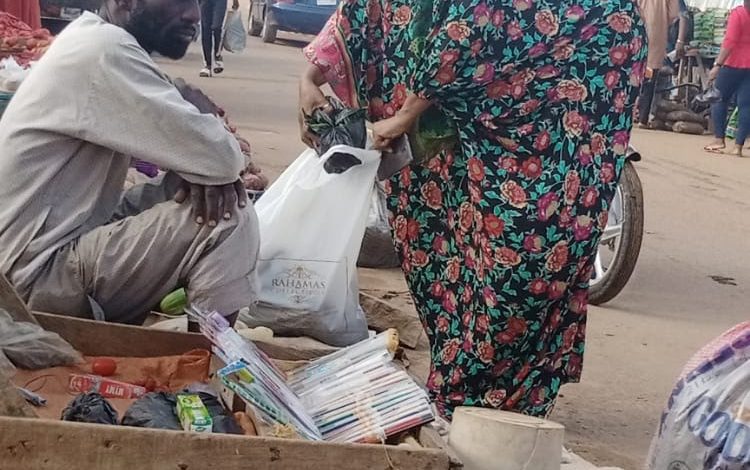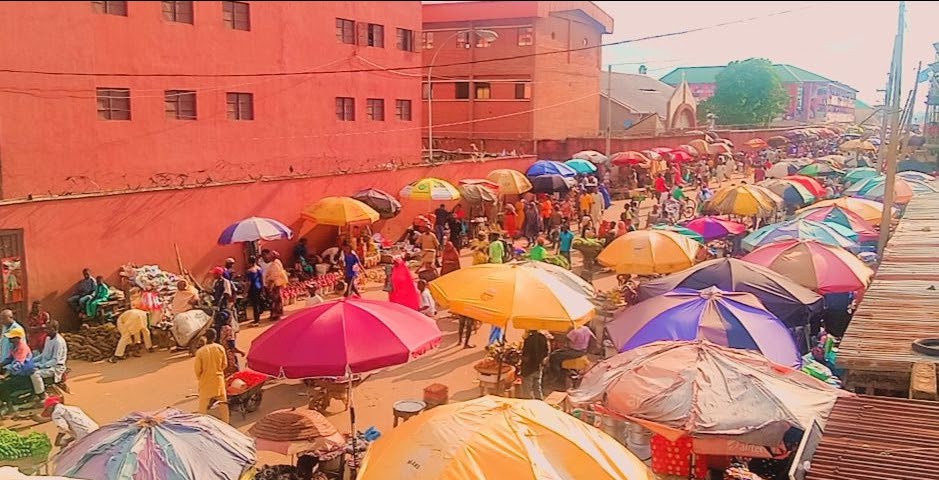#COVID19: Kaduna Traders Suffering Losses As Third Wave Hits
Traders in Central Market, Kaduna, Northwest Nigeria are still battling the effect of the COVID-19 pandemic on sales as they fear that another lockdown, if initiated, might completely ruin their business.

Despite having to spend long hours journeying from his home in Gonin-gora to Kaduna’s Central Market –named Abubakar Mahmud Gumi Market– daily, Emeka (last name withdrawn) suffered depression after losing all his goods to COVID-19’s lockdown initiated by the state government last year.
Emeka, a foodstuff trader, had been trading for over 20 years prior to the pandemic; making a lot of profit from his goods worth over two million naira. “Now, I do not even have goods worth twenty thousand naira on my table,” he lamented.
“They locked the market for six months. All my things in the shop got spoiled. After that, they demolished the market. Now I don’t have anything to do or sell on my table. I borrowed money from somewhere to buy these little things you see here on the table,” Emeka added.
Just like Emeka, Hassana Sulaiman’s –another wholesale foodstuff trader- business collapsed after the lockdown measures were lifted. “Since we could not come out during that period to sell, all the goods in my shop got spoiled,” she stressed.
Hassana, who had a shop in the Central Market, could not gather any financial support to restock her shop or pay the rent. After several efforts, she managed to secure a space in kasuwar mata (women’s market).
Kaduna’s initiatives during lockdown
Kaduna reported its first case of COVID-19 on Mar. 27, 2020 after which the state implemented a total lockdown for 75 days backed by its Amended 2020 Quarantine Law.
As part of efforts to restore the source of livelihood of the poor and vulnerable, the state government, through the intervention of the World Bank and the Federal Government, commenced a KADUNA CARES initiative.
With a loan of $20 million from the World Bank to states, the initiative was targeted at benefiting 33,022 households directly and 180,000 indirectly; 16,420 farmers directly and over 100,000 indirectly. Also, 2,787 businesses directly and over 60,000 indirectly.
Similarly, about 227,754 urban poor residents were reported to become beneficiaries of the federal government Expanded Cash Transfer Programme – an initiative that would provide stipends for six months to beneficiaries.
According to BudgIT, the state also received a major share of over N2 billion naira from the N60 billion federal intervention to support states during the period.
Despite the supposed availability of these funds, Hassana said she had not been a beneficiary, despite filling out forms to secure it.
“I have been filling several forms and I did not get anything. I filled at least three different forms to secure this loan. The last one I filled was even brought down to my house but we did not hear anything.”
“I remember filling the COVID-19 survival fund form but no reply after that. You can see my colleagues too, we all need assistance. If the government can help us with these loans, I can invest it in my business,” she said.
‘We are yet to recover from losses incurred’
“I usually travel down to the East to buy my products wholesale and sell them here in Kaduna, but during the lockdown I could not and that has affected my market till date,” John Peter, a trader at the market told this reporter.

“After the lockdown was lifted, everything became expensive, including transportation and that affected the business. I was not able to secure any loan, so I just managed the little I had,” he added.
For Oskuko Oskukobasi, who sells electrical appliances at Kereji road, the consistent increase in the price of goods had also made him unable to recover from the effects of the pandemic.
“I used to buy and sell goods at a very reduced price rate. But now prices are high. When you try explaining to the customers, they think you intentionally increased it. You get to the market to buy products at a particular rate today and when you go back it has increased. We did not have this before the whole pandemic.”
“On a daily basis, I make at least a profit of N20,000 to N30,000, but now, with the consistent increase in prices, I find it difficult to gather N5,000 at the end of the day. The prices of things are increasing and money is not circulating,” he emphasised.
For Oskukobasi, acquiring a loan was a problem for him because, “when you go there, they tell you to bring collateral and as a poor man trying to survive, you might not have a tangible one,” Oskukobasi said. “The only people that might find it easy are the government workers or salary earners. But we business people don’t have any collateral to drop.”
Intervention needed as COVID-19 third wave hits the state
In July, the federal government announced that six states and the Federal Capital Territory were on red alert, following the emergence of the Delta variant of COVID-19. These states are; Lagos, Oyo, Rivers, Kaduna, Kano, Plateau, and the Federal Capital Territory, Abuja.
In a statement signed by the chairman of the Presidential Steering Committee on COVID-19, Boss Mustapha, he said, “The PSC, however, warns that all states of the federation should heighten their state of preparedness and continue to enforce all protocols put in place, given the renowned greater ease of spread of the Delta variant. These steps are critical as we begin to see worrisome early signs of increasing cases in Nigeria.”
After this announcement, the Kaduna State government stressed the need for all residents to adhere to prevention measures. This recent development worries traders who believe that if another lockdown is imposed to contain the spread of the virus, it will cripple their business.
“After the lockdown was lifted, I had to call customers on the phone to inform them that I was back at the market before I got some little patronage. If another lockdown is issued, it would affect all businesses,” Joy Bako, a trader on Kano Road told HumAngle.
Another trader, who identified as Mr Karian, said that aside from incurring losses from damaged goods and the demolition of his shop, he lost money to debtors. He added that the recent COVID-19 development will lead to a crisis for traders struggling to survive.
“I had to borrow N200,000 from the bank to start up my business. All I need is capital. If I can get enough, it would really help my business,” Emeka said.
Hassana added that “the government can increase the beneficiaries of these interventions and make it available for everyone. It would really help in my business right now.”
- This story is supported by Innovation for Change (I4C) hub through BudgIT Foundation.
Support Our Journalism
There are millions of ordinary people affected by conflict in Africa whose stories are missing in the mainstream media. HumAngle is determined to tell those challenging and under-reported stories, hoping that the people impacted by these conflicts will find the safety and security they deserve.
To ensure that we continue to provide public service coverage, we have a small favour to ask you. We want you to be part of our journalistic endeavour by contributing a token to us.
Your donation will further promote a robust, free, and independent media.
Donate HereStay Closer To The Stories That Matter




